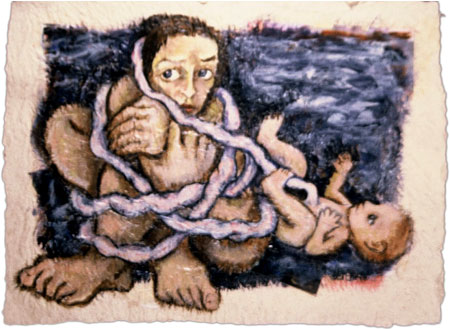
I struggle with the concept of talking about my PND because I’m a doula, because there are a lot of people I’ve tried to hide it from, because I feel embarrassed, I feel guilty, and I don’t want to be that negative person everyone has on their friends list. But I’m human, and today is a bad day, so sometimes it’s refreshing to work with the raw emotions and go with it.
Today I sat in the bathroom with my partner after the school run and sobbed. I cried about the guilt, the hypothetical situations I might find myself in in the future, the double life I lead, the ‘what ifs?’, the heavy cloud that lives above my head and the realisation that the cloud is a part of me and it will always be there, weighing me down.
Nearly 7 years ago I was induced and gave birth to my son, then he turned 3. That’s all I remember. I missed 3 years. I remember parts, but I couldn’t tell you what his first words were, when he first rolled over, what his favourite food was, or what we did together. I feel guilty because when he asks me questions about his first few years I have to lie. I don’t have a book of firsts to show him and I don’t have pictures. I have a grey and hazy memory which seems like a dream, almost like life hadn’t started yet. The memories of nothing haunt me, they makes my gut ache and my throat tighten, I’m close to tears 90% of the time. My anxiety is still here, its a part of me now. I can’t function if there is a background noise, I am paranoid, I am delicate and I’m vulnerable. I need to take each day at a time, but so do most people right?
Somehow though, with the help of my family and my partner, I’ve managed to bring up a clever, inquisitive, confident young boy with an endearing and charismatic personality. He is loved by many, including myself, although it may not seem it some days. I would kill for that boy, I know I would. He is my boy, we just have to work a little harder together, which makes our relationship more special. He chose me to grow him and nurture him and thankfully, I haven’t broken him, which is a huge relief.
My blog hasn’t been published for self pity, or attention. It’s been published because PND and anxiety happens, because people need to talk about it, and because living with PND doesn’t mean you’re ‘mental’ or ‘unsafe’, it means the balance in your hormones aren’t quite right, or your circumstances aren’t easy. Go easy on yourself and reach out. You’ve ended up in the middle of nowhere and you don’t speak the language, but you’ll pick it up, it takes a while, but you’ll get there. So speak out, you won’t be the only one.
http://www.pndsupport.co.uk
http://www.mind.org.uk/information-support/types-of-mental-health-problems/postnatal-depression/


